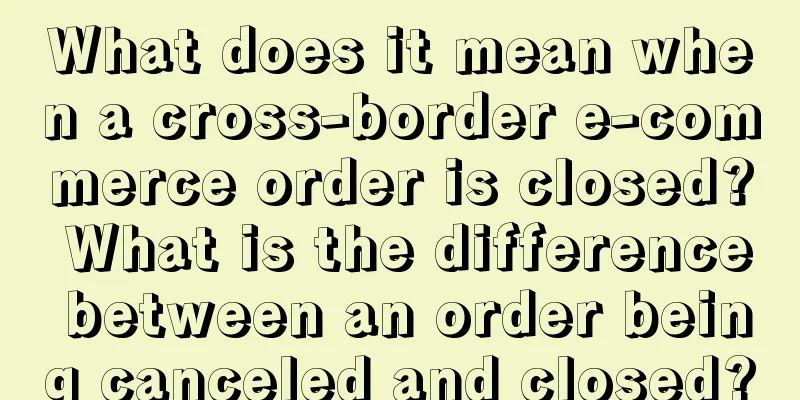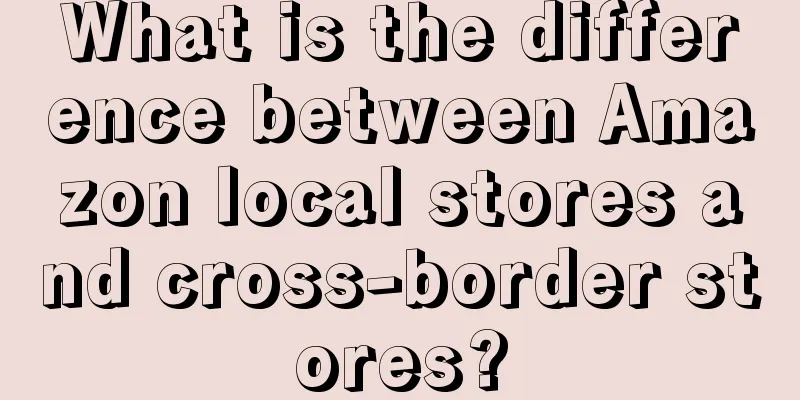What does it mean when a cross-border e-commerce order is closed? What is the difference between an order being canceled and closed?

|
In cross-border e-commerce, sellers and buyers often encounter order closures, but what does this really mean? This article will delve into the meaning of cross-border e-commerce order closures and the difference from order cancellations, providing sellers and buyers with a clear explanation and handling method. 1. Meaning of order closing Order closure refers to the situation in which an order cannot be completed normally due to some reason during the transaction process and is eventually closed by the system. Order closure may be triggered by the seller, buyer or the system automatically. The reasons vary, but its meaning usually includes the following aspects: Buyer cancels order: After placing an order, the buyer has the right to cancel the order within a certain period of time. If the buyer makes a cancellation request within the specified time and the seller agrees, the order will be closed. Seller cancels order: In some cases, the seller may need to cancel the order, such as out of stock, wrong price, etc. If the buyer agrees or does not respond in time, the order will be closed. Payment issues: If the buyer fails to complete the payment within the specified time after the order is generated, the system may automatically close the order. This usually happens when an online payment method is selected but the payment is not successful. System risk control: In cross-border e-commerce platforms, the system will conduct some risk monitoring. If abnormal or high-risk transactions are found, the system may close the order to ensure the security of the transaction. Transaction disputes: If a transaction dispute occurs between a buyer and a seller, the system may close the order after certain mediation and processing. Closing an order does not necessarily mean there is a problem or dispute; it can be a means of handling the situation in a normal trading process. 2. What is the difference between canceled and closed orders? In cross-border e-commerce, order canceled and order closed are two common statuses, but they have some subtle differences, mainly reflected in the following aspects: Cancelled entity: A canceled order is usually requested by the buyer or seller and executed after the other party agrees. A closed order may be automatically closed by the system or by the intervention of platform personnel. Time of Cancellation: Orders are usually cancelled at the initial stage of the transaction or when the goods have not been shipped, while orders may be closed at any stage of the transaction, including when they have been shipped but need to be closed for some reason. Reasons for closure: An order may be closed due to a variety of reasons, including payment issues, system risk control, transaction disputes, etc. An order may be cancelled because the buyer and seller agree on certain matters of the transaction, or because of the buyer's subjective reasons for canceling the order. Transaction status: A canceled order usually means that the transaction has not entered the actual stage of commodity circulation, while a closed order may occur when the goods are shipped, waiting to be received, or completed. Knowing the difference between an order being canceled and an order being closed is important for both sellers and buyers. When dealing with transaction disputes or cancellation requests, clarifying the order status can provide a better understanding of the transaction process. 3. How to handle order closing When sellers or buyers encounter order closures, they can take appropriate measures based on the specific reasons: Communication and negotiation: Both parties can communicate through the platform's messaging system to understand the reasons for the closure and negotiate if necessary. Some problems may be caused by misunderstandings and can be resolved through timely communication. Follow platform regulations: Cross-border e-commerce platforms usually have clear regulations and policies to handle order closures. Sellers and buyers should follow the platform regulations. Provide evidence: If the closure is due to a dispute or complaint, both parties can provide relevant evidence to support their claims. This may include transaction records, chat records, product photos, etc. Handle problems promptly: If an order is closed due to the seller's own reasons, such as out of stock, price error, etc., the seller should handle the problem in a timely manner to minimize the occurrence of order closures. Learning experience: Different order closures may be an experience accumulation for both sellers and buyers. Both parties can summarize the experience after dealing with the current problem so as to better deal with similar situations. Through rational communication and reasonable negotiation, the issue of order closure can be properly resolved, which will also help improve the trading experience of both parties on the platform. |
<<: What are the categories of cross-border e-commerce? What does cross-border e-commerce do?
Recommend
Behind the ranking of China's overseas short drama apps: Did the "bosses" make money?
Compared with domestic regulations and platform re...
How to solve the problem of duplicate entry in Shopee? How to judge?
When you open a store on Shopee, you may encounter...
In the tea industry worth hundreds of billions of dollars, how can brands improve their performance through private domains?
The concept of private domain has become popular a...
What is Wanlihui? Is Wanlihui safe?
In this context, cross-border payments are becomin...
Marketing Calendar | Creative Marketing in April, What Can You Do?
The April marketing calendar is here! No creative ...
How to fill in the delivery address on eBay? Any suggestions?
eBay is a relatively well-developed cross-border e...
Behind Xiaohongshu's monthly e-commerce sales of 3 million, I have summarized a set of methods
With the rise of Xiaohongshu e-commerce, small and...
Which is better, Amazon or Lazada? How to choose?
If you want to do cross-border e-commerce, you can...
How to register a wish seller account? What are the advantages?
With the development of the cross-border industry,...
618, how are the new consumer brands doing?
At the beginning of 2023, all topics surrounding c...
Is it easy to place orders on Shopee? How to place orders?
When you are doing cross-border e-commerce, you ge...
eBay Germany Buyer Protection Policy Update
eBay Germany announced that from December 12, 2023...
Should a new Shopee store advertise? Tips on how to advertise on Shopee
As a cross-border e-commerce platform, Shopee is v...
How should I choose products when I first start selling them on Amazon?
It is easy to register an Amazon store, but it is ...
Is there any risk in helping others register for Amazon? What are the potential risks?
There are many advertisements now that offer to he...









